The 6 Best Foods for Lovebirds
This page contains affiliate links. We may earn money or products from the companies mentioned in this post through our independently chosen links, which earn us a commission. Learn More
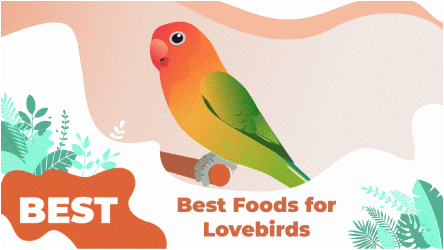
Aptly named, lovebirds are very intelligent and affectionate birds. They are a small, stocky type of parrot that tends to do best when kept in pairs.
Not only are they a joy to keep, but they can also be quite entertaining because they are very curious and always into exploring.
These birds are beginner-friendly, but they do require a bit more care than other species.
Keep reading to learn more about lovebirds, including their nutritional needs. You’ll also see our top 6 picks for the best bird food for lovebirds.
We highly recommend looking at the comparison table we have below where we highlighted the features of each product. You’ll also find more detailed information about each product later in the article.
Compare Best Foods For Lovebirds
|
Overall Best
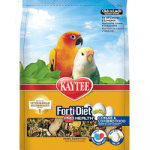
1. Kaytee Egg-Cite! Forti-Diet Pro Health Conure & Lovebird Food |
|||||
|
Crude Protein
15.5% Min |
Crude Protein
14.0% Min |
Crude Protein
11.0% Min |
Crude Protein
14.0% Min |
Crude Protein
14.0% Min |
Crude Protein
11.0% Min |
|
Crude Fat
10% Min |
Crude Fat
16.5% Min |
Crude Fat
9.0% Min |
Crude Fat
15.0% Min |
Crude Fat
7.0% Min |
Crude Fat
6.0% Min |
|
Crude Fiber
12% Max |
Crude Fiber
9.8% Max |
Crude Fiber
11% Max |
Crude Fiber
3.5% Max |
Crude Fiber
10% Max |
Crude Fiber
3.5% Max |
|
Moisture
12% Max |
Moisture
15% Max |
Moisture
|
Moisture
12.0% Max |
Moisture
|
Moisture
3.5% Max |
What Do You Need to Know About Lovebirds?
The lovebird is named for its loving, attentive bond that it forms with its mate. These birds are a small species of parrot, ranging from about 5 to 6 ½ inches in length. They have hooked bills like other parrots but short, blunt tail feathers – they are also stockier in build than other pet birds.
In captivity, these birds tend to live 10 to 12 years, though some have been known to live over 15 years. Quality nutrition is essential for a long, healthy life for lovebirds.
These birds feed on seeds, berries, fruit, grains, and grasses in the wild, so variety is very important for a pet lovebird.
In addition to a healthy diet, lovebirds also require a very large cage because they are an active bird. You should plan to provide four perches for each pair as well as plenty of space for food and water dishes as well as a space for bathing. Lovebirds love to drink and bathe, so make sure to provide lots of fresh water.
How To Choose The Best Bird Food For Lovebirds?
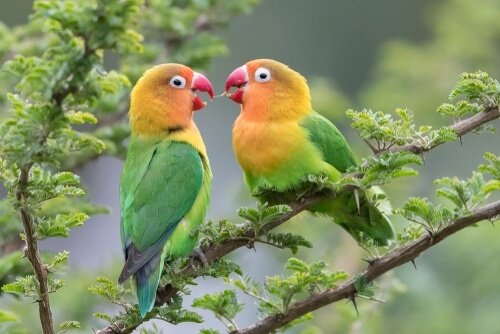
Wild lovebirds forage for a wide variety of foods including seeds, grains, grasses, fruits, berries, and leaf buds.
You can also offer small amounts of protein in the form of unshelled peanuts and other nuts.
Here are some things to look for in food for lovebirds:
- Complete and balanced – Commercial pellets provide complete and balanced nutrition in every bite, but some birds simply don’t like them in comparison to seeds.
- Variety of seeds – Most birds love to eat seeds, and some develop a preference for a certain type, but it is important to include a variety of the sake of balanced nutrition.
- Grains, fruits, and veggies – Grains help to provide variety in a lovebird’s diet, so look for grains to be included along with seeds and dried fruits and veggies.
- No artificial additives – In addition to checking that your lovebird food contains certain ingredients, there are also things you do NOT want to see like artificial colors, flavors, and preservatives.
Our Top Picks For The Best Foods For Lovebirds
Keep reading to see our top 6 recommendations for the best bird food for lovebirds.
It is your choice whether you feed your lovebirds a commercial pellet or a blend of seeds, but make sure to choose a high-quality product either way.
Kaytee Egg-Cite! Forti-Diet Pro Health Conure & Lovebird Food
Product Info
- Crude Protein: 15.5% Min
- Crude Fat: 10% Min
- Crude Fiber: 12% Max
- Moisture: 12% Max
Guaranteed Analysis

Dry Matter Basis

- Varied blend of seeds, grains, fruits, and veggies for balanced nutrition
- Contains no artificial preservatives
- Enriched with essential vitamins and minerals and omega-3s
- Contains some artificial colors
- Some lovebirds may pick out only the seeds they like
This recipe is also enriched with omega-3 fatty acids which, in addition to supporting brain and heart health, also keep your bird’s feathers healthy. This formula contains no artificial preservatives but it does contain added prebiotics and probiotics for digestive support.
Volkman Avian Science Lovebird & Conure Bird Seed
Product Info
- Crude Protein: 14.0% Min
- Crude Fat: 16.5% Min
- Crude Fiber: 9.8% Max
- Moisture: 15% Max
Guaranteed Analysis

Dry Matter Basis

- Wholesome blend of healthy and delicious ingredients
- Formulated specifically for lovebirds
- Supplemented with vitamins, minerals, and amino acids
- Some lovebirds might pick out only the seeds they like
- Some shipments contains bugs or webs
It is a wholesome daily diet that contains both healthy and delicious ingredients like safflower seed, millet, canary grass seed, and dried fruits and veggies. It provides complete and balanced nutrition but also contains exotic ingredients that will appeal to picky eaters.
Sweet Harvest Conure and Lovebird Bird Food
Product Info
- Crude Protein: 11.0% Min
- Crude Fat: 9.0% Min
- Crude Fiber: 11% Max
Guaranteed Analysis

Dry Matter Basis

- Contains a wide variety of seeds and grains to appeal to lovebirds
- Complete and nutritionally balanced on the whole
- Enriched with essential nutrients to promote vibrate plumage
- Some birds tend to pick out only the seeds they like best
- Some bags contain a lot of pumpkin seeds which many lovebirds dislike
You’ll also be glad to know that this formula is enriched with essential vitamins, minerals, amino acids, and omega-3s to ensure vibrant feathers, healthy skin, and longevity. Overall, it is nutritionally complete and balanced for lovebirds, though some birds tend to pick out only the seeds they like best.
Hari Tropimix Enrichment Cockatiel & Lovebird Food
Product Info
- Crude Protein: 14.0% Min
- Crude Fat: 15.0% Min
- Crude Fiber: 3.5% Max
- Moisture: 12.0% Max
Guaranteed Analysis

Dry Matter Basis

- Complete and nutritionally balanced with great taste
- Essential vitamins and amino acids for healthy plumage
- Comes in a zippered bag to keep the product fresh
- Simply doesn’t seem to appeal to some lovebirds
- Some lovebirds will pick out the sunflower seeds and only eat them
This recipe builds the immune system by stimulating circulation and it provides essential vitamins and amino acids for healthy plumage. This formula has a great taste that appeals to lovebirds and comes in a zippered bag to ensure freshness.
Vitakraft Vitasmart Cockatiel & Lovebird Food
Product Info
- Crude Protein: 14.0% Min
- Crude Fat: 7.0% Min
- Crude Fiber: 10% Max
Guaranteed Analysis

Dry Matter Basis

- Enriched with DHA for healthy heart and brain, omega-3s for plumage
- High diversity formula appeals to most birds
- Complete and balanced nutrition in every bag of seed
- Some birds will pick through and only eat their favorite seeds
- Contains some artificial coloring
This recipe supports your lovebird’s complete health and wellness while also appealing to his preferences for flavor. Plus, it is enriched with omega-3s for bright plumage and DHA for healthy heart and brain function.
Roudybush Daily Maintenance Mini Bird Food
Product Info
- Crude Protein: 11.0% Min
- Crude Fat: 6.0% Min
- Crude Fiber: 3.5% Max
- Moisture: 3.5% Max
Guaranteed Analysis

Dry Matter Basis

- Uniquely formulated and sized for small birds 3 inches and larger
- Nutritionally complete and balanced in every bite
- No artificial additives, colors, or sugars
- Some birds are resistant to a pelleted diet
- Pellets may still be too large for some birds
These pellets are completely balanced in terms of nutrition, so you don’t need any supplements. The recipe is scientifically formulated and doesn’t contain any added sugars, colors, or artificial preservatives.
How Much Should You Feed Your Lovebirds?
On average, lovebirds consume between 1 ½ and 2 ounces of feed per day.
The amount your lovebird eats may vary depending on its activity level, so if you provide a large enough cage for the birds to exercise they may require more food for energy.
How Many Times a Day Should You Feed Your Lovebirds?
Most birds tend to eat small amounts throughout the day, so plan to provide a day’s worth of food for your lovebirds once a day.
It is important to thoroughly clean the feed dish before you refill it and to always provide plenty of fresh water.
Lovebirds drink a lot of water, so you may also need to check the dish throughout the day to see if it needs to be refilled.
Final Remarks
Complete and balanced nutrition is the key to long-term health and wellness for your lovebirds, so purchase the highest quality bird food you can consistently afford.
]Commercial pellets provide complete and balanced nutrition in every bite, but many birds prefer seed.
If you’re not sure where to start shopping for lovebird food, try one of our top 5 picks reviewed above!






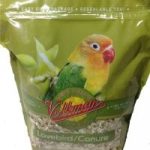
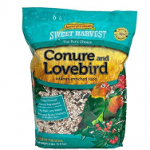
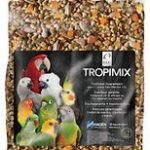
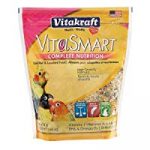
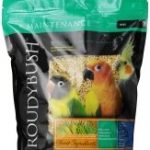
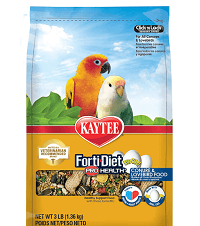
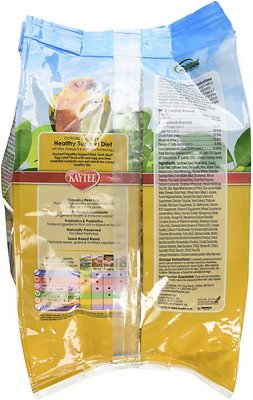
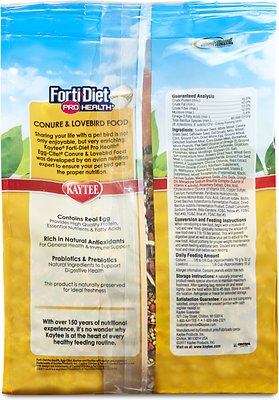
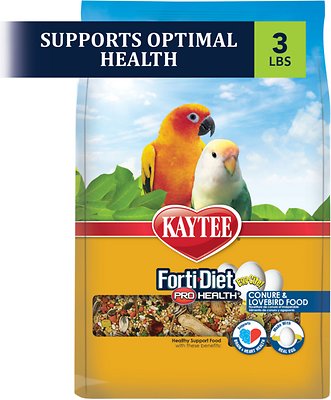


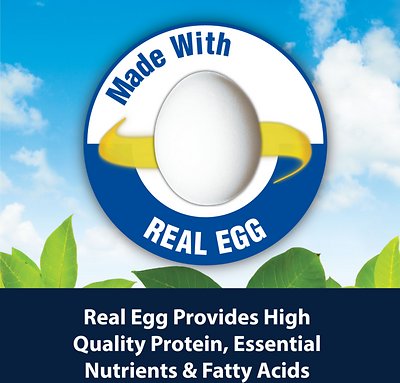

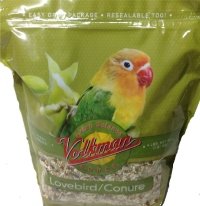
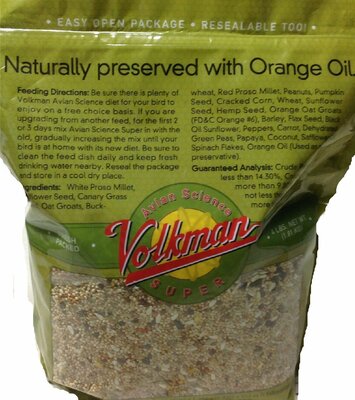
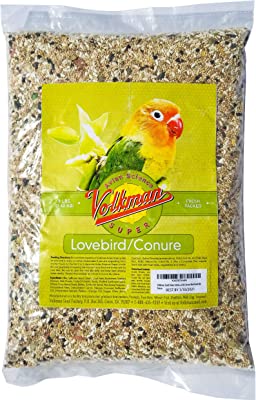
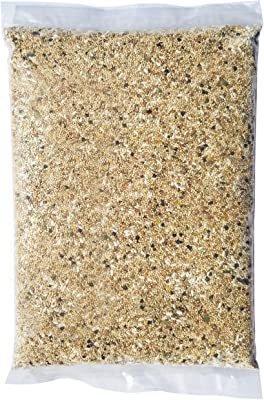
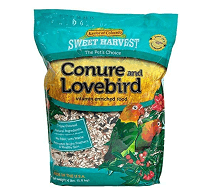
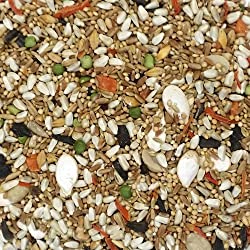
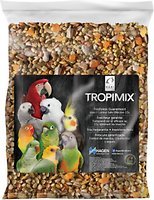
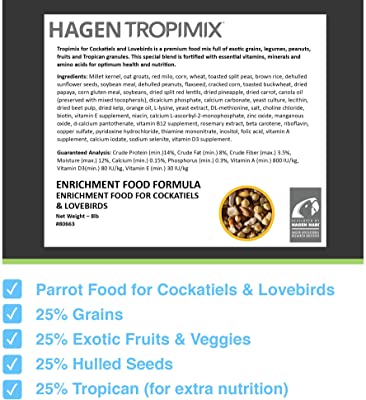
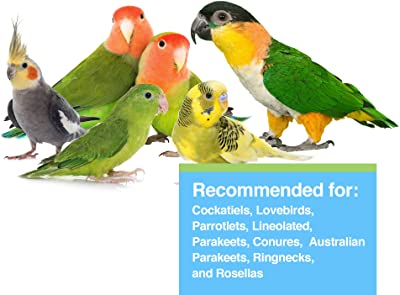
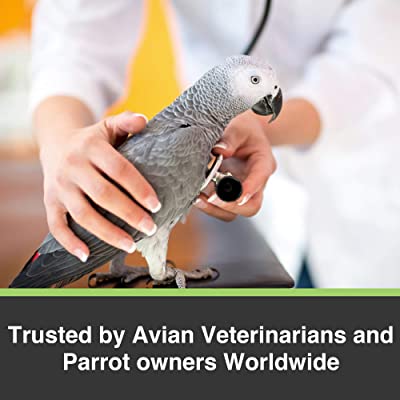
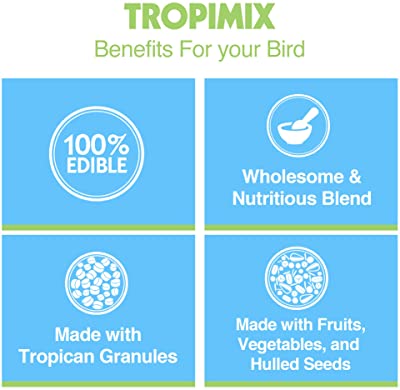
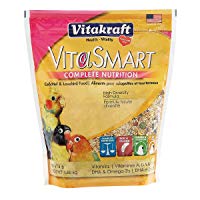
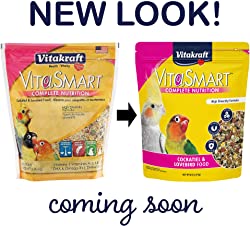
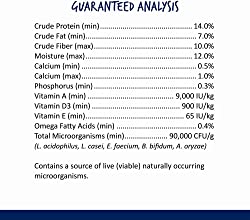
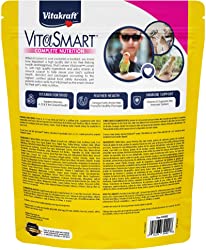
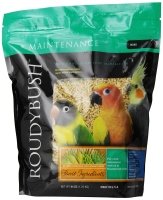
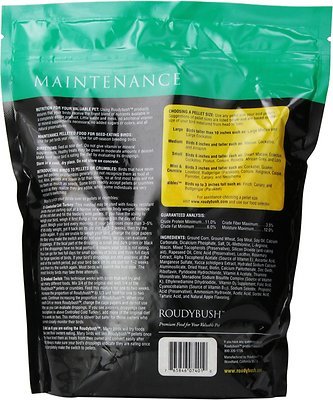
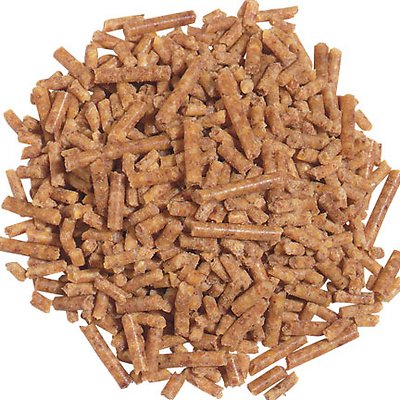
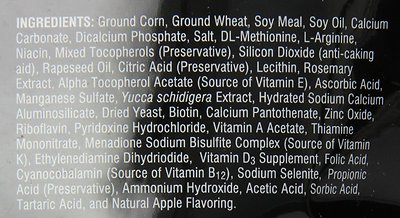

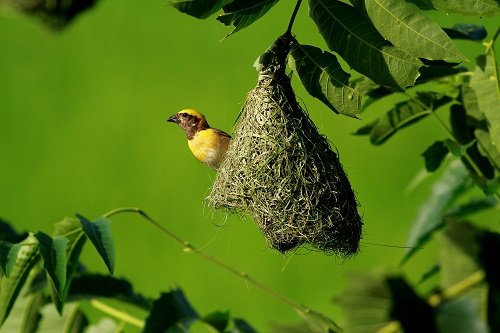
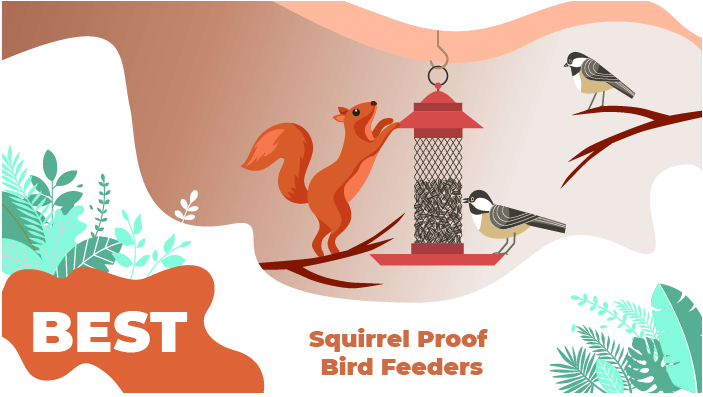
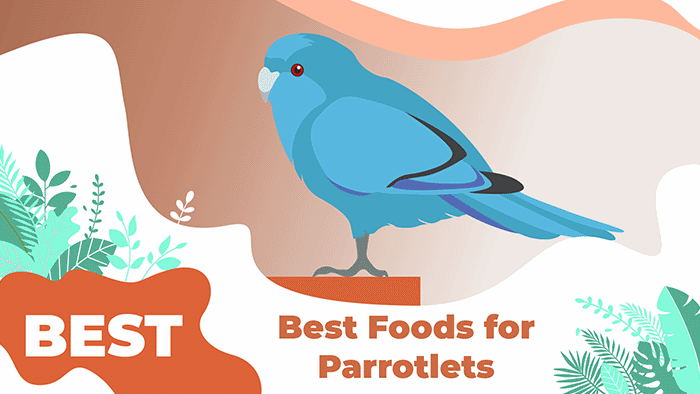
Heather
I am buying a baby (7 week old) Love Bird and want to know the best food to feed it.
Kate
Congrats on your new friend! Since your lovebird is going to be newly weaned, you'll want to introduce him to a variety of different foods over time. If you plan on feeding him a pelleted diet, start early. You can mix it with seeds and other foods to give him some variety, but it's important to introduce it early so he doesn't form a preference for seed only. Find more info about foods to offer your lovebird here: https://wereallaboutpets.com/what-do-lovebirds-eat
Savo
Hi I'm planning on getting a pet lovebird and i want to know ,what should i feed them ?
Kate Barrington
Hi Savo! Lovebirds feed primarily on seeds, grains, and fruits in the wild but you can decide whether you want to feed yours a seed mix or pelleted diet. Here is another detailed article about choosing the best diet for your lovebird: https://wereallaboutpets.com/best-food-for-lovebirds
Rebecca
Hi, I have a lovebird, she layed eggs in January, I let her sit on them for 28 days like the vet suggested. Then in a couple of weeks later she layed eggs again, I let her set on those, and today, I found that she has laid 4 more eggs! Is this normal for a lovebird? I also got a mate for her, but she fight's him and I have to keep them seperated, because she bites him until she brings blood. I tried opening their cage doors, so they could go in and out as they please, but she goes in his cage and runs him out trying to bite him, what do I do to get them to be friends?
Kate Barrington
Hey Rebecca, great questions! Female lovebirds lay up to 12 eggs per clutch, though the average is 4 to 6. It's completely normal for them to lay a clutch every 3 to 4 weeks when there is a male present. In terms of helping them get along, you may want to keep them in separate cages for a while and slowly introduce them to each other. Place the cages next to each other for 10 to 15 minutes, then separate them again. Keep doing this, increasing the amount of time they spend near each other until the aggression goes away.